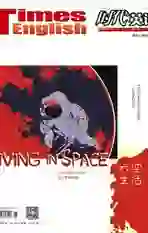Unit 9 Can you come to my party?
2019-11-07
重点知识园地
重点单词
1. prepare v. 使做好准备;把……准备好
She will prepare the food ahead of time.
她会提前准备好食物。
(1)prepare for 为……做准备
I cant go to your party because I have to prepare for the math test.
我不能去参加你的聚会了,因为我要为数学考试做准备。
(2)prepare sb for sth 使某人对某事物有准备
She said so because she wanted to prepare Tom for the news.
她这样说是为了让汤姆对这个消息做好准备。
preparation n. 准备;(pl.)准备工作
We threw ourselves into the preparations with enthusiasm.
我们满怀热情地投入到准备工作中。
2. exam n. (=examination) 考试
The exam results will be out tomorrow.
考试成绩明天公布。
(1)entrance exam 入学考试
He failed the schools entrance exam.
他没有通过这所学校的入学考试。
(2)take an/the exam 参加考试
How many students are taking the exam tomorrow?
明天有多少学生参加这场考试?
3. available adj. 有空的;可获得的
I am available tomorrow.
我明天有空。
Is this dress available in a larger size?
这款连衣裙有大一号的吗?
注意:available后面可以跟to do引出具体事务。
Im afraid I wont be available tomorrow to help with housework.
我明天恐怕没时间做家务了。
4. until conj. & prep. 到……时;直到……为止
Lets wait until the rain stops.
让我们等到雨停吧。
not... until 直到……才
Father didnt come back home until midnight.
爸爸昨晚半夜才回家。
I didnt watch TV until 9 oclock last night.
我昨晚9点才看电视。
5. hang v. 悬挂;垂下
A gold necklace hung around his neck.
他脖子上挂着一条金项链。
Tom is hanging the picture on the wall.
汤姆正把这幅画往墙上挂。
hang out 闲逛;常去某處
I used to hang out in supermarkets.
我以前常常去超市闲逛。
He always hung out in the bar.
他常去酒吧鬼混。
hang v. 绞死;吊死
He was hanged for murder.
他因犯谋杀罪被处以绞刑。
6. catch v. 及时赶上;接住;抓住
He probably caught the ten-thirty train to Tianjin.
他可能赶十点半去天津的火车。
Tom caught the keys as they fell.
汤姆抓住了掉落的钥匙。
How many fish did you catch?
你抓到多少鱼了?
catch up with 追赶上……
You have to work hard to catch up with the top students in your class.
你要努力学习才能追上班里的优秀学生。
catch v. 偶然撞见
I caught him just as he was leaving his office.
他正要离开办公室时我碰上了他。
7. reply v. 回答;答复
reply作不及物动词时,后面不能直接跟宾语,常用介词to引入宾语。
He never replied to any of my letters.
我的信他从来不回。
She smiled, but didnt reply.
她微微一笑,但未作答。
reply n. 回答;答复
She made no reply.
她没有回答。
In reply to our questions, she just smiled.
她以微笑回答我们的提问。
8. without prep. 没有;不(做某事)
without是介词,后面跟动词时,必须用动名词。
They have spent two days without food.
他们两天没吃东西了。
Dont go out without your coat.
别不穿外套就出门。
He went upstairs without saying a word.
他一字不说上楼去了。
重点短语
1. the day before yesterday 前天
the day after tomorrow 后天
He left for New York the day before yesterday but will come back the day after tomorrow.
他前天去纽约了,后天才回来。
2. look after 照料;照顾
相当于 take care of。
People dont look after other peoples things in the same way as they look after their own.
人们看管他人的东西可没有对待自己的东西上心。
Dont worry. Ill look after (= take care of) the kids tomorrow.
别担心,明天我来照料孩子们。
3. turn down 拒绝
相当于refuse。
We politely turned down his invitation.
我们礼貌地拒绝了他的邀请。
They offered him a job but he turned it down.
他拒绝了他们提供的工作。
注意:refuse后面跟动词时,要用动词不定式。
They refused to accept that there was a problem.
他们不承认出现了问题。
4. look forward to 盼望;期待
其中to是介词,其后接名词、代词或动名词作宾语。
Im looking forward to your reply.
我期待你的答复。
Mary is looking forward to visiting Sydney.
玛丽期待去悉尼参观。
5. hear from 接到(某人的)信、电话等
We havent heard from her for ages.
我们好久没有收到她的消息了。
I look forward to hearing from you.
我期待收到你的消息。
Police want to hear from anyone who has any information about the crime.
警方希望有此案线索的任何人与他们联系。
活学活用
用所给词的适当形式填空
1. The girls are preparing ____ (they) for the party.
2. I dont know who she ____ (hang) out with now.
3. Jack never ____ (reply) to my e-mails when we were in middle school.
4. I gave her a watch but she ____ (turn) it down.
5. Mike is ____ (look) forward to ____ (visit) London.
基本语法
情态动词can
情态动词can除了表示能力、许可或猜测之外,还可以用于表示邀请。
1.发出邀请用一般疑问句句式
结构:Can + 主语 + 动词原形 + 其他?
Can you come to my party?
你能来参加我的聚會吗?
2.对于邀请的回答
肯定:
(1)Sure, Id love to. 当然,我很乐意。
(2)Yes, Id love to. 好的,我很乐意。
(3)Sure, I think he/she/they will. 当然,我想他/她/他们会的。
否定:
(1)sorry, Im not available. 对不起,我没空。
(2)Im sorry. Im not free this weekend. I have to look after my little sister. 对不起,我这周末没空。我得照看我妹妹。
(3)Id love to, but Im afraid I cant. I have to go to the doctor. 我很乐意,但恐怕不行。我得去看医生。
提出邀请、请求、建议或征求别人的意见,常见的表达方式有:
1. Would you like sth?/Would you like to do sth?
Would you like to go shopping with us?
你愿意和我们一起逛街吗?
2. Will/Would/Could you please do sth?
Will/Would/Could you please help me clean the classroom?
请你帮我打扫教室,好吗?
3. Shall we do sth?
Shall we have a picnic together?
我们一起野餐,好吗?
4. Lets do sth.
Lets go to the mountains and camp there.
我们去山上露营吧。
5. Why not do sth?/Why dont you do sth?
Why dont you go with me?
为什么不和我一起去?
6. How/What about doing sth?
How/What about taking a bus there?
坐公交车去那里怎么样?
